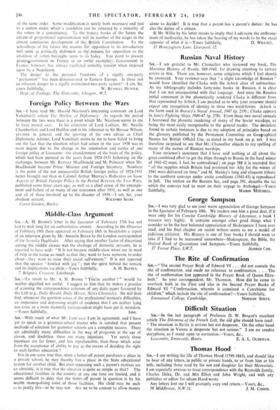SIR,—With much of what Mr. Lunt says I am in
agreement, and I have yet to speak to a grammar-school master who is satisfied that present methods of selection for grammar schools are a complete success. There are admittedly many difficulties in the way of prognosis at the age of eleven, and doubtless there are many injustices. Yet surely these injustices are far fewer, and less reprehensible, than those which arise from the acceptance of ability to pay as the means of deciding the right to such further education ?
It is in one sense true that, when a better-off parent purchases a place in a private school, he may thereby free a place in the State educational system for another child. But even supposing such a parent's motives are so altruistic, is it true that the situation is quite so simple as that? The educational facilities in the country at any one time are limited, and it seems difficult to deny that the better-off parent in question is by his wealth monopolising some of those facilities. His child may be such as to justify this—or he may not. Are we to be content to allow money alone to decide? It is true that a parent has a parent's duties: he has also the duties of a citizen.
If Mr. Willis by his letter means to imply that I advocate the enthrone- ment of mediocrity, he has taken the bearing of my words to be the exact opposite of what it is.—Yours faithfully, D. WILLorr. 35 Honeysgreen Lane, Liverpool, 12.


































 Previous page
Previous page